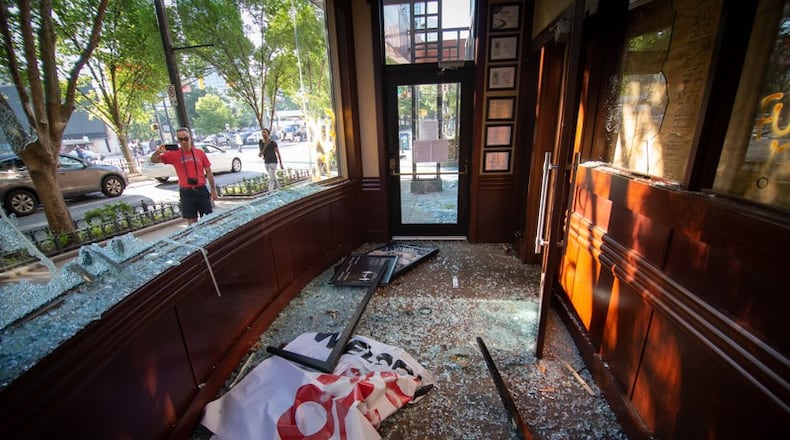Two very different parts of Atlanta were hit Friday night by angry protesters—affluent Buckhead and rough-around-the-edges Downtown. Riot scenes were unsettling, but it's unlikely that either area sustained a fatal economic blow, business and city leaders said Saturday.
To be certain, both neighborhoods were already struggling to recover from the weeks-long coronavirus shutdown. A full rebound from COVID-19 is almost certain to be delayed because of the protests, said A.J. Robinson, president of Central Atlanta Progress and the Atlanta Downtown Improvement District.
The city has experienced these types of situations before, however, and has shown it can claw its way back, he said.
“Downtown’s resiliency and diversity will carry the day,” Robinson said. “Since the Olympic bombing we have endured the Brian Nichols affair, Occupy Atlanta, a large tornado, the Black Lives Matter protests a few years ago and now the pandemic.”
>> MINUTE-BY-MINUTE: Second day of demonstrations begin, curfew for city of Atlanta
>> PHOTOS: Atlanta braces for second night of protests
>>MORE: Atlanta stories from a night of violence
Protests began peacefully on Friday evening but slowly turned violent with police cars going up in flames and businesses' windows smashed and their inventories looted. The protests followed the death of George Floyd, an African American who died after a Minneapolis officer pinned him down with a knee on his neck while he was handcuffed.
On one stretch of Peachtree Road in Buckhead, almost every building had some damage to it, said Buckhead Community Improvement District executive director Jim Durrett.
Rioters smashed the windows at the College Football Hall of Fame downtown and raided the gift shop. STATS Brew Pub, a sports bar on Marietta Street, was heavily damaged by protesters. A glass window at a Parking Co. of America office was smashed and a fire was started inside. Some glass entranceways to the World Congress Center buildings also sustained damage, said a spokeswoman.
The CNN Center was hit hard, as glass windows were smashed, protesters scuffled with police and a large sign of the red CNN logo that's a popular tourist photo spot was damaged by vandals. The sign was cleaned and repainted early Saturday morning, a CNN spokeswoman said.
>>PHOTOS: Atlanta deals with aftermath of violent protests
The convention and tourism industry that powers Downtown’s economy had recently shown signs of life. The makeshift hospital set up at the World Congress Center recently closed down and the facility was scheduled to host some small conventions in June.
The Atlanta Convention and Visitors Bureau is still assessing the damage to downtown, including graffiti, broken glass and lost merchandise.
“These setbacks are tough for businesses already hard hit by the current pandemic,” said ACVB president and CEO William Pate in a written statement. “However, we believe repairs can be made quickly and will not impact our ability to welcome conventioneers and visitors back to Atlanta later this summer.”
>> PHOTOS: Atlanta rally against police violence draws hundreds, turns violent
>> RELATED: Violence rocks Atlanta as peaceful protest ends in flames
>> COMPLETE COVERAGE: Atlanta protests
City officials had not compiled a cost estimate of the property damage as of Saturday afternoon. It may take more time than usual to generate that estimate, Robinson said.
“Businesses will have their insurance folks come in and assess the damage, but that’s going to take a few days,” he said. “A lot of folks were already closed due to the pandemic.”
Most insurance policies should cover property damage caused by riots, fires and civil unrest, Robinson said.
Downtown’s recovery should be helped by the fact that the rioting took place in a concentrated area, said Tom Smith, an Emory University economist.
“Downtown Los Angeles was decimated by the Rodney King riots” in 1992, Smith said. “It took them a couple of months to come back from that. Here, it’s just a couple of buildings that were damaged. Other businesses (that weren’t damaged) probably won’t hesitate to reopen quickly.”
Buckhead’s tourism sector had also been slammed by the coronavirus, with both Lenox Square and Phipps Plaza shut down for weeks and the area’s 7,000-plus hotel rooms all but empty.
Still, Buckhead had shown signs of life, with both malls reopening in recent weeks.
A Corner Bakery on Peachtree Road in Buckhead, which had been closed for weeks, was planning to reopen on Monday. But using the eatery’s patio furniture, protesters broke every window. Inside they stole iPads, computers and equipment used to ring up sales.
“We spent all week cleaning up the store, disinfecting everything, to get ready to open on Monday,” said CEO Frank Paci as he surveyed damage Saturday morning with a broom in his hand. “Now we have to clean up and do it all over again.”
Buckhead’s comeback will probably be pushed back after the rioting, said Sam Massell, president of the Buckhead Coalition.
“It really sets us back,” Massell said. “The sad part is that some of these stores were struggling already because of the coronavirus.”
Still, Buckhead is seen as a safe place and the community is rallying; Home Depot agreed to donate supplies to help businesses that were targeted, he said.
Both Buckhead and Downtown have significant numbers of office-based workers, many of whom have been teleworking for weeks. Some companies have recently begun an attempt to lure their employees back to the office, but those efforts may now be postponed, said Larry Mock, managing partner of the private-equity firm Navigation Capital Partners.
“They’ve been trying to encourage people to safely go back to work and this is just one more dimension adding to the fear and uncertainty,” said Mock, whose company invests in small and mid-sized businesses throughout Atlanta.
Downtown and Buckhead took the brunt of the damage because they’re high-profile areas and not because of any underlying weakness in either neighborhood, Emory’s Smith said. People who live, work or shop in either area know that comes with the territory of being in Buckhead or Downtown and probably won’t be shy about returning.
“It wouldn’t have made sense to do these protests in downtown Alpharetta because it wouldn’t get a lot of attention there,” he said. “You do it in places where you can be seen and where you’re likely be heard.”
Mayor Keisha Lance Bottoms’ quick response should also help calm fears that Buckhead and Downtown should be avoided, and could help foster a quick economic recovery, said Mock, the private equity executive.
“It’s good to see a civic leader confront the issue head-on,” Mock said. “Business leaders want to see a strong, immediate, well-reasoned response to these unfortunate circumstances.”
-Leon Stafford and Rodney Ho contributed to this report
Keep Reading
The Latest
Featured





